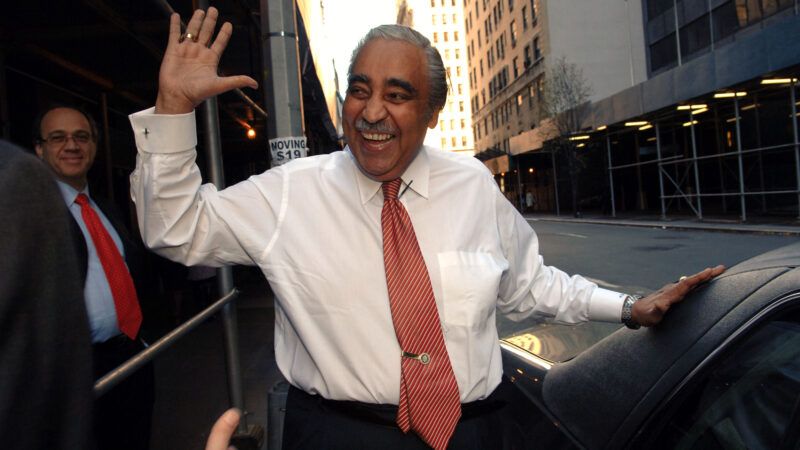How Charlie Rangel Changed His Mind About the War on Drugs
The former congressman, who died this week, transformed from a zealous prohibitionist into a drug policy reformer.

It "seemed like a good idea at the time," Charlie Rangel remarked in 2021, referring to the draconian drug penalties he supported as a New York congressman in the 1980s. "Clearly, it was overkill."
Rangel, who died on Monday at the age of 94, came to that conclusion after enthusiastically supporting the war on drugs for decades, going so far as to criticize Republicans as soft on the issue. His transformation from a zealous prohibitionist into a drug policy reformer reflected his recognition of the human costs inflicted by heavy-handed criminalization.
A former federal prosecutor who was first elected to Congress in 1970, Rangel was a founding member of the Congressional Black Caucus who represented Harlem in the House until 2017. He played a leading role in drug policy as a member of the House Select Committee on Narcotics Abuse and Control, which he chaired from 1983 to 1993.
"Even though the administration claims to have declared a war on drugs, the only evidence we find of this war [is] the casualties," Rangel complained in June 1986, a week after the cocaine-related death of Len Bias, a star University of Maryland basketball player who had just been drafted by the Boston Celtics. "If indeed a war has been declared, I asked the question, 'When was the last time we heard a statement in support of this war from our commander in chief?'"
A few months after Rangel demanded action, Congress approved the Anti-Drug Abuse Act of 1986, which established mandatory minimum penalties for drug offenses, including a sentencing scheme that treated smoked cocaine as if it were 100 times worse than the snorted kind. Two years later, another Anti-Drug Abuse Act made crack penalties even more severe, prescribing a minimum five-year sentence for simple possession of more than five grams—less than the weight of two sugar packets.
In a 1989 Ebony profile that dubbed him "The Front-Line General in the War on Drugs," Rangel explained the rationale for such legislation. "We need outrage!" he said. "I don't know what is behind the lackadaisical attitudes towards drugs, but I do know that the American people have made it abundantly clear: They are outraged by the indifference of the U.S. government to this problem."
Four years later, when Rangel introduced a bill that would have eliminated three crack-specific mandatory minimums, he was already having second thoughts about this get-tough approach. By that point, the senseless penal distinction between crack and cocaine powder had led to stark racial disparities and prompted objections from federal judges, whose criticism would soon be amplified by the U.S. Sentencing Commission.
"In response to the onslaught of cocaine abuse in the 1980s," Rangel explained in 2007, "the nation crafted a drug policy totally lacking in compassion, and worse, that was totally unfair to the weakest, and most disadvantaged, in society." By his telling, "the sudden, frightening epidemic of a new street drug…impelled besieged lawmakers to enact stiff punishments for crack cocaine offenses."
Rather than "reducing drug addiction and crime," Rangel said, those laws "swelled prison populations, created a sentencing divide that victimized young Black men, left a generation of children fatherless, and drove up the costs of a justice system focused more on harsh punishment than rehabilitation." In other words, the "stiff punishments" that Rangel thought would help his community had the opposite effect.
Rangel's evolution extended beyond crack penalties. By 2011, the same congressman who in 1991 had defended the war on drugs in a debate with National Review founder William F. Buckley Jr. was co-sponsoring a bill aimed at ending federal marijuana prohibition.
"It simply doesn't make sense to waste billions of dollars putting hundreds of thousands of Americans in prison for non-violent offenses," Rangel declared in 2012. His change of heart, which began earlier and went further than a similar shift by Joe Biden, provided hope that even the most gung-ho drug warrior can learn from experience.
© Copyright 2025 by Creators Syndicate Inc.


Show Comments (33)